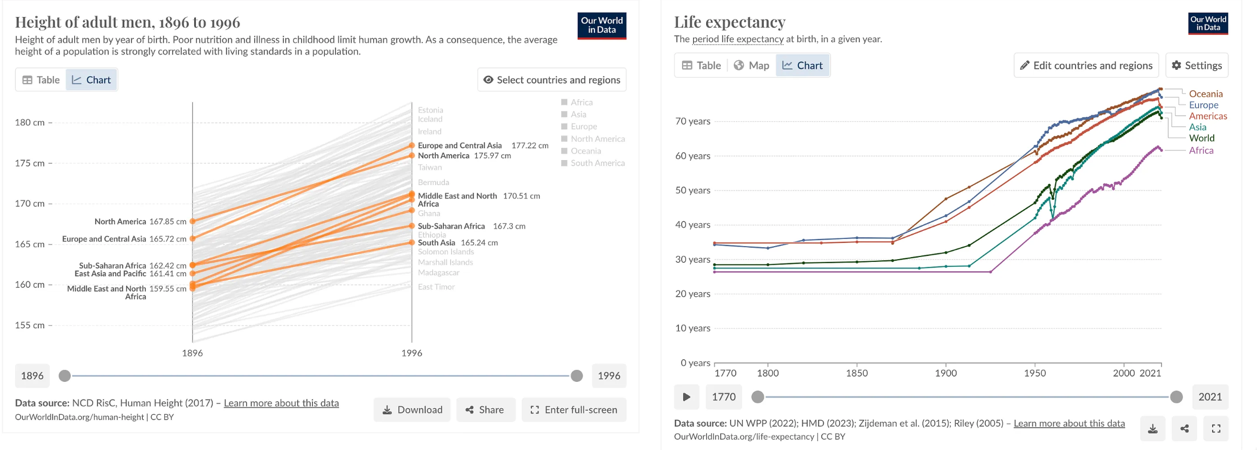The Birth of Modern Prosperity: Ilari Mäkelä Interviews Brad DeLong
& I highly recommend Ilari Mäkelä’s “On Humans” Podcast…
Audio: <https://overcast.fm/+8kS9Nlf7M>
Webpage: <https://onhumans.substack.com/p/brad-delong-on-the-birth-of-modern>: Ilari:
What is the biggest story of the 20th Century? The battles of ideologies? The collapse of empires? The transformation of China? None of these, according to Brad DeLong. Rather, he told me: “The big story, starting around 1870, is … how humanity for the first time has to deal with the idea that we are probably going to become rich as a species. That’s the big picture. That’s the big story. That’s the story of the long 20th century.” I think DeLong is onto something. Future archaeologists might deduce the Iron Curtain by comparing Eastern housing units to Western suburbia. They might deduce British imperialism from Victorian buildings in Mumbai. But they could simply not miss that humans across the globe have grown older, taller, and wildly richer…. Indeed, whatever virtues we find in the lifestyles of our pre-modern ancestors, their lives were challenged by the risk of poverty. According to DeLong, this was a life: “… in which you between two and four inches shorter than we are because of calcium and other nutritional deficits. It’s a life in which … potentially one in seven women dies in childbirth. And all of that changes — or the potential for all of that — changes after 1870”…
Ilari Mäkelä: A very brief note before we get started. If you want to read in addition to, or instead of listening, you can read episode breakdown of this and other episodes of the series of The Birth of Modern Prosperity at onhumans.substack.com. There’s also a link in the show notes.
I hope that you enjoy it.
This is the “On Humans” podcast with your host, Ilari Mäkelä. And the journey continues. The journey to understand the birth of modern prosperity.
So this is a four-part series, small feast of curated highlights from my conversations with some of the world’s leading economic historians. And don’t worry if you haven’t listened to part one, each of these episodes can stand on their own, but whether you have or have not listened to that, it might be useful to have a quick zooming out of where we are right now. So we all know that humans are richer today than ever before.
And some of us rejoice in this. Others worry about its impacts on climate, on Earth’s limits. I personally do both.
But this series is not really about celebrating or worrying. It’s about explaining how we got to be where we “are. So in part one, I had Oded Galor, author of Journey of Humanity on the show, who explained what he sees as the big arc of humanity’s economic history.
And the big arc, at least, since the dawn of agriculture is very simple. There are ups, there are downs. But until the 1800s, nothing really changes for the average person.
How could this be? You might ask us. Technologies sure did get better.
Well, Galor says that it happened because improvements in technology, agriculture, etc. led to more humans, not to more prosperous humans. Humans became better at getting grain from a single patch of land.
But so we had more and more humans living from that single patch of land. So this is the so-called Malthusian trap. Now, my guess in episode three, Daron Acemoglu will push back against this Malthusian thinking.
But my guess today, Brad DeLong broadly agrees. And indeed, he will give many, he will agree with many things that Galor says. And he’s a very good person in explaining how Malthusian trap interacts, for example, with patriarchy.
And so Galor and DeLong agree on a lot of timing, including the escape from the “escape from the trap 150 years ago, so in the 1870s. But they disagree on what changed. Galor focused on the role of education, especially family science, which then changes the economy.
DeLong flips things around. He focuses on the economy, on inventors, on corporations, globalization, which then changes education and family. And I will let him tell you why.
If you like DeLong so much, that you want to hear more of him, you can head to episode 18, which is the full episode. And if you like this material more generally, do subscribe to On Humans podcast and the On Humans newsletter. On Humans newsletter, you can find it on
Anyway, let’s get the show started.
So here is Brad DeLong on what he thinks is the biggest story of the long 20th century. And might be the biggest story in the history of our species.
Brad DeLong: Big story starting around 1870 is the end of the Malthusian era and how humanity now for the first time has to deal with the idea that we are probably going to become rich as a species. That’s the big picture. That’s the big story. That’s the story of the long“20th century.
The elevator-pitch summary is: Yes, we learned how to bake a sufficiently large economic pie, something vastly in excess of what any previous century would thought could ever be needed. But the problems of slicing and tasting the pie, of equitably distributing it, and then using it wisely and well so that people feel safe and secure and are healthy and happy—those problems of slicing and tasting, of distribution and utilization continue to flummox us pretty much completely.
And hence we are not in utopia.
Our predecessors—this would have struck them as rather strange, because previous centuries would have seen baking the sufficiently large economic pie as the major problem.

